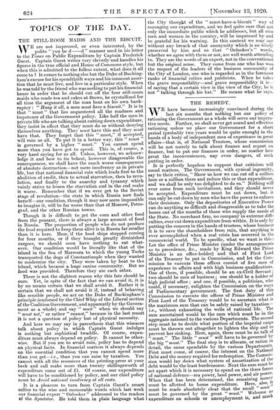TOPICS OF THE DAY.
THE STILL-ROOM MAIDS AND THE BISCUIT.
WE are not impressed, or even interested, by the polite "you be d—d " manner used in his letter to the Times on Public Expenditure by Captain Frederick Guest. Captain Guest writes very cleverly and handles his figures in the true official and House of Commons style, but when this is admitted to the fullest extent, what does it all come to I It comes to nothing else but the Duke of Bucking- ham's excuse for his spendthrift ways and his innocent asser- tion that he must live, and live in a particular style. When he was told by the friend who was seeking to put his financial house in order that he should cut off the four still-room maids who made tea and cakes at Stowe, he crystallized for all time the argument of the man bent on his own bank- ruptcy: "Hang it all, a man must have a biscuit." It is in that " must" that lies sequestered all the madness and impotence of the Government policy. Like half the men in private life who are talking about cutting down expenditure, they insist in effect that they must do so without denying themselves anything. They must have this and they must have that. They forget that this "must," if accepted, will ruin us all. To put it in a better way, this " must " is governed by a higher "must." You cannot spend snore than you have got to spend. This is, of course, a very hard saying for us all. Unless, however, we acknow- ledge it and bow to its behest, however disagreeable the consequences, we shall have the much worse consequences of absolute destruction—not mere insolvency as in private life, but that national financial ruin which leads first to the abolition of credit, then to actual starvation, then to revo- lution, and finally to the anarchy and tyranny which vainly strive to lessen the starvation and in the end make it worse. Remember that if we ever get to the Soviet stage of revolution—the state in which Russia now finds herself—our condition, though it may now seem impossible to imagine it, will be far worse than that of Moscow, Petro- grad, and the other Russian towns.
Though it is difficult to get the corn and other food from the peasant, there is always a large amount of food in Russia. The proportion of people who do not produce the food required to keep them alive is in Russia far smaller than it is here. Here, if the food ships stopped coming for four months, or if they brought greatly diminished cargoes, we should soon have nothing to eat what- ever. Our condition would be literally like that of the island in the Sea of Marmara to which the young Turks transported the dogs of Constantinople when they wanted to modernize the city. They were taken by boat to the island, which became a huge canine community. But no food was provided. Therefore they ate each other.
There is not the slightest reason why this fate should be ours. Yet, in spite of the fact that we can avoid it, it is by no means certain that we shall avoid it. Rather it is certain that we shall not avoid it if, instead of behaving like sensible people, we act on the Duke of Buckingham's principle (endorsed by the Chief Whip of the Liberal section of the Coalition Government, and apparently by the Govern- ment as a whole) and say "must" when we should say "must not," or rather "cannot," because in the last resort it is not a question of policy but of physical necessity.
And here we may say in parenthesis that this wiseacre talk about policy in which Captain Guest indulges is nothing but sophistical twaddle. Of course, expen- diture must always depend on policy. It cannot be other- wise. But if you are to avoid ruin, policy has to depend on physical facts. In financial matters it always depends on the essential condition that you cannot spend more than you get—i.e., than you can raise by taxation. You cannot with all the resources of the printing-press at your beck and call make more than twenty shilhngsworth of expenditure come out of El. Of course, our expenditure will have to be conditioned by policy, and our chief policy must be Avoid national insolvency at all costs.
It is a pleasure to turn from Captain Guest's smart sallies to the wise and memorable words which last week our financial expert " Onlooker " addressed to the readers of the Spectator. He told them in plain language what
the City thought of the " must-have-a-biscuit " way of managing our expenditure, and we feel quite sure that not only the immediate public which he addresses, but all wise men and women in the country, will be impressed by and be grateful for his warning. In this context we may say without any breach of that anonymity which is so wisely preserved by him and us that " Onlooker's " words, whether we agree with them or not, are well worth attending to. They are the words of an expert, not in the conventional but the original sense. They come from one who has woo the respect of the leaders of the business community of the City of London, one who is regarded as in the foremost ranks of financial critics and publicists. When he takes the grave responsibility—and grave responsibility it is— of saying that a certain view is the view of the City, he is not "talking through his hat." He means what he says.






































 Previous page
Previous page